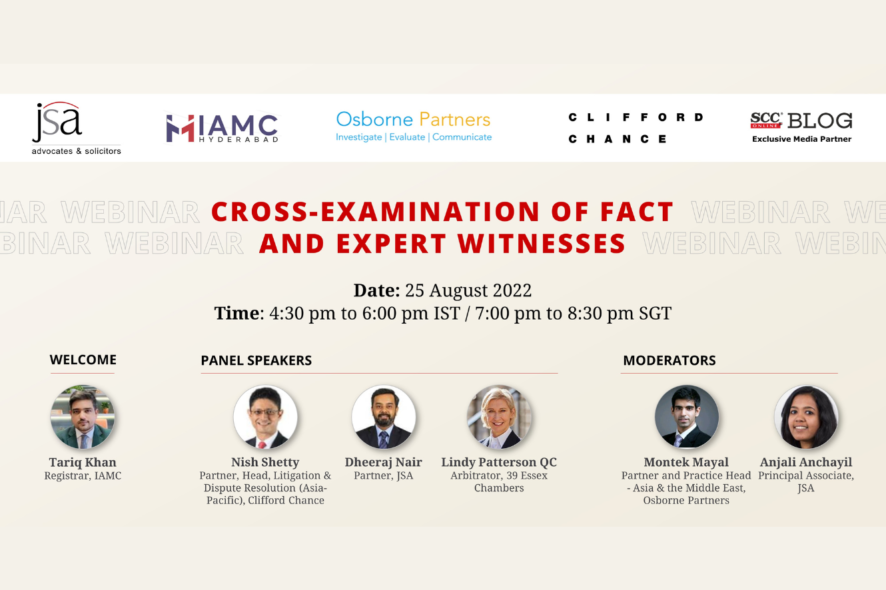JSA, Advocates & Solicitors, in collaboration with Osborne Partners, Clifford Chance, 39 Essex Chambers, IAMC Hyderabad and SCC Online Blog organised a webinar on August 25, 2022 on “Cross-Examination of Fact and Expert Witnesses.”
The panel comprised Mr. Nish Shetty, Head — Litigation & Dispute Resolution (Asia — Pacific), Clifford Chance, Mr. Dheeraj Nair, Partner & Head — Dispute Resolution, JSA, Advocates & Solicitors, and Ms. Lindy Patterson QC, Arbitrator, 39 Essex Chambers.
The session was moderated by Mr. Montek Mayal, Partner and Practice Head — Asia & the Middle East, Osborne Partners and Ms. Anjali Anchayil, Principal Associate, JSA, Advocates & Solicitors.
Mr. Tariq Khan, Registrar, IAMC Hyderabad welcomed the panellists, moderators and attendees to the session.
The panel discussed and shared insights from the perspective of counsel, arbitration and expert witnesses on the do’s and don’ts of, and best practices to be adopted when, cross-examining fact witnesses and expert witnesses.
The session commenced with Mr. Mayal and Ms. Anchayil inviting the panel’s views on the role of fact and expert witnesses in commercial disputes, and what counsel and arbitrators expect to accomplish from cross-examination of witnesses. Mr. Nair mentioned that his goal in cross-examination was demolishing the opposing party’s case, while at the same time setting up his case. He also pointed out the significance of cross-examination in building closing arguments.
Ms. Patterson shared her perspective as an arbitrator on cross-examination and how she prepares before cross-examination. She mentioned how her goal was sometimes different from that of the counsel cross-examining, in that she wanted to understand the witness’s version, and gauge his or her honesty. Therefore, she would focus on asking questions that counsel did not cover during cross-examination. She pointed out that counsel should choose the questions for cross-examination carefully, focussing on the important points, rather than ask questions on every paragraph or fact in the witness statement.
The panel discussed the preparation strategies they adopt as counsel for cross-examination. Mr. Shetty emphasised the importance of preparation — particularly knowing the issues, the pleadings and the record of the case thoroughly. When choosing which witnesses to cross-examine, it is important to know the issues and evidentiary basis of the dispute, and let these be the guide. Mr. Nair added that it was also important to identify the stronger witnesses as well as the weak links in the chain (the “angels and demons” as he puts it), and assess how each witness would fare in cross examination.
The moderators also put questions to the panel on familiarising witnesses on the cross-examination process, and the line to be drawn between coaching the witness and witness preparation. The panellists covered the importance of walking the witness (particularly a first-time witness) through the process followed in a cross-examination, so that the fact witness has a good recollection of events and is able to face counsel who may be aggressive or ask uncomfortable questions. They also touched upon the different rules in various jurisdictions on witness preparation, and how hypotheticals (unconnected to the dispute) could be used for familiarising witnesses for cross-examination. Ms. Patterson mentioned how as an arbitrator, she identifies whether a witness has been coached.
Mr. Mayal, having deposed in a number of arbitrations as an expert witness, shared his views on how he prepares for cross-examination, and how holes are poked in the opposite side’s expert report.
Mr. Shetty and Mr. Nair discussed how to develop a style of cross-examining, the strategies for dealing with difficult witnesses — witnesses who answer only yes or no without explaining anything, argumentative witnesses and emotional witnesses. They also discussed what to avoid when cross-examining witnesses — asking open-ended questions, asking for witnesses’ opinions, asking for interpretation of legal provisions etc. Ms. Patterson provided her perspective on how tribunals view difficult witnesses and the common mistakes counsel make when cross-examining.
The session ended with a discussion on how joint expert statements and hot-tubbing could be used to make cross-examination of witnesses more effective. Ms. Patterson and Mr. Mayal mentioned how joint expert statements were very helpful in narrowing down the scope of expert witness cross-examination to only those points on which the experts disagree. Ms. Patterson also covered how as an arbitrator, hot-tubbing or witness conferencing assisted in assessing expert witness testimony better.






